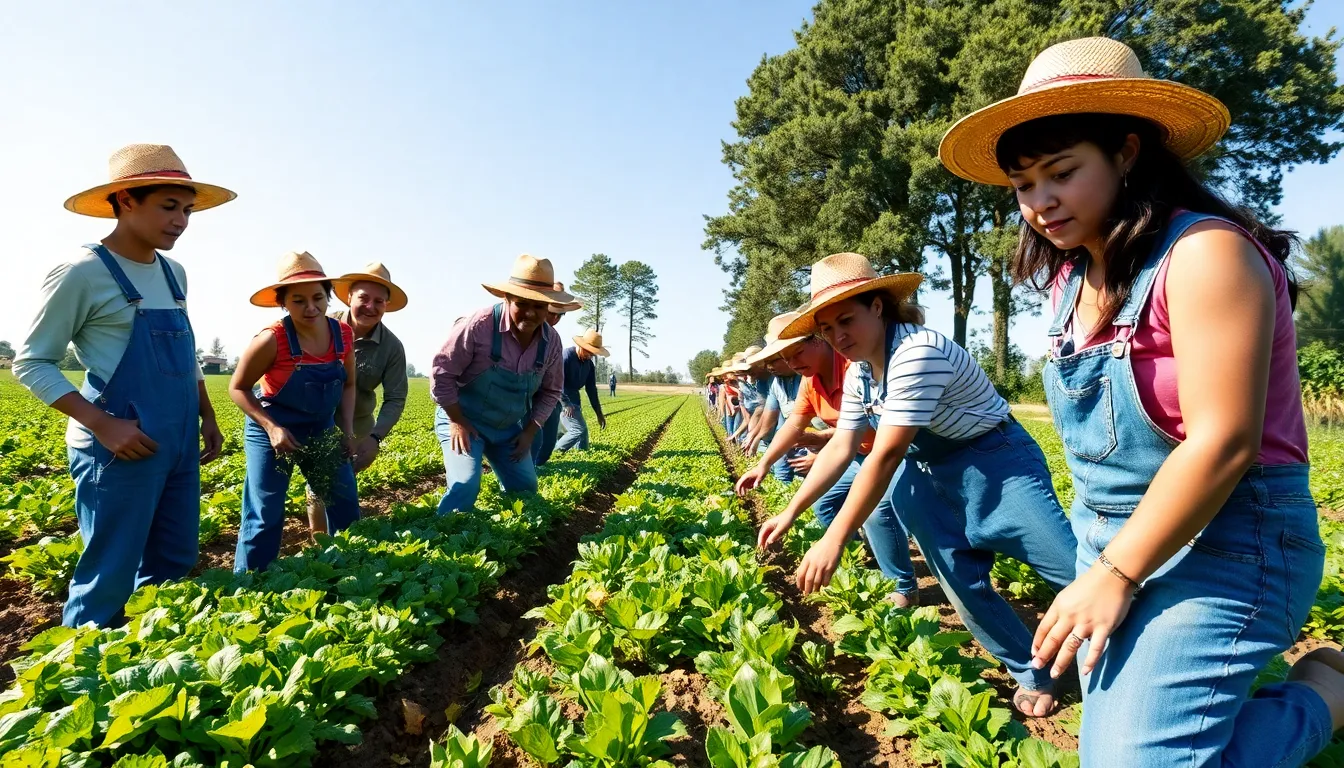Table of Contents
ToggleIn a world increasingly aware of environmental challenges, sustainable food practices are gaining momentum. These practices not only aim to reduce the ecological footprint of food production but also promote healthier lifestyles and communities. From farm to table, every step of the food chain can embrace sustainability, ensuring that future generations inherit a thriving planet.
Farmers, consumers, and businesses all play crucial roles in this movement. By adopting methods like organic farming, reducing food waste, and supporting local producers, individuals can contribute to a more sustainable food system. As awareness grows, so does the opportunity to make informed choices that benefit both the environment and personal well-being. Embracing sustainable food practices isn’t just a trend; it’s a necessary shift towards a more resilient and responsible way of living.
Overview of Sustainable Food Practices
Sustainable food practices focus on reducing the environmental impact of food systems while fostering healthier communities. These methods are crucial for ensuring food security and promoting ecological balance.
Definition and Importance
Sustainable food practices refer to agricultural and consumption methods that prioritize environmental health, social equity, and economic viability. These practices encourage responsible production, processing, distribution, and consumption of food. The importance of these practices lies in their ability to combat climate change, preserve biodiversity, and promote human health. According to the Food and Agriculture Organization (FAO), adopting sustainable practices can significantly decrease greenhouse gas emissions and enhance food safety for current and future generations.
Key Principles
Key principles of sustainable food practices include:
- Agroecology
Agroecology emphasizes ecological interactions in farming. This principle promotes biodiversity, soil health, and crop resilience.
- Organic Farming
Organic farming avoids synthetic pesticides and fertilizers. It relies on natural inputs, enhancing soil fertility and ecological stability.
- Local Sourcing
Local sourcing minimizes transportation emissions. Supporting local farmers strengthens community economies and reduces carbon footprints.
- Seasonal Eating
Seasonal eating aligns food choices with local harvests. This approach promotes fresher, nutrient-rich foods while reducing reliance on long-distance supply chains.
- Waste Reduction
Waste reduction targets the massive food waste issue. Implementing strategies like composting and donating surplus food can significantly decrease landfill contributions.
- Water Conservation
Water conservation measures focus on efficient usage and management. Techniques such as drip irrigation can preserve water resources and improve crop yields.
- Animal Welfare
Animal welfare initiatives promote humane treatment. Ensuring ethical standards in livestock farming contributes to healthier ecosystems and food products.
Implementing these principles fosters a sustainable food system that benefits individuals, communities, and the planet.
Types of Sustainable Food Practices

Sustainable food practices encompass various methods that enhance environmental health, social equity, and economic viability. These approaches help mitigate climate change effects and promote food security while benefiting local communities.
Organic Farming
Organic farming emphasizes the use of natural processes and materials. This method avoids synthetic pesticides and fertilizers, enhancing soil health and biodiversity. Organic farms often utilize crop rotation and cover cropping to maintain soil fertility. Certification ensures adherence to strict regulations, fostering consumer trust. According to the USDA, organic farming systems increase soil organic matter by 20% to 30%, which improves water retention and reduces erosion.
Regenerative Agriculture
Regenerative agriculture focuses on rebuilding soil health and ecosystem functions. This practice includes techniques like cover cropping, conservation tillage, and rotational grazing. These methods replenish nutrients and enhance carbon sequestration, improving overall biodiversity. The Rodale Institute indicates regenerative agriculture can reduce greenhouse gas emissions by sequestering carbon in the soil, making it a vital strategy for reversing climate change.
Agroforestry
Agroforestry integrates trees and shrubs into agricultural landscapes, creating symbiotic relationships between crops and forestry. This practice enhances biodiversity, improves soil structure, and provides shade and shelter for crops. Agroforestry systems can yield income from both timber and crops, promoting economic resilience. Studies show that incorporating trees can increase crop yields by up to 30% while also boosting ecosystem services like pollination and water management.
Benefits of Sustainable Food Practices
Sustainable food practices lead to significant advantages for the environment, the economy, and individual health. Understanding these benefits emphasizes the importance of adopting sustainable methods in food production and consumption.
Environmental Impact
Sustainable food practices significantly reduce negative environmental effects. They decrease greenhouse gas emissions through methods like organic farming and regenerative agriculture, which enhance soil health. By promoting biodiversity, these practices help restore ecosystems and protect wildlife habitats. Furthermore, local sourcing minimizes transportation emissions and supports community resilience while conserving water resources through efficient irrigation practices. Implementing these strategies contributes to a healthier planet and combats climate change effectively.
Economic Advantages
Sustainable food practices offer measurable economic benefits. Local food systems generate jobs within communities, supporting local farmers and businesses. Investing in sustainable agriculture can increase long-term profitability for farmers by enhancing soil fertility and reducing dependency on costly synthetic inputs. Additionally, as consumer demand for sustainable products rises, businesses adopting these practices often attract more customers, leading to higher sales. Efficient resource use also lowers overall production costs, providing a win-win scenario for farmers and consumers alike.
Health Benefits
Sustainable food practices contribute to improved health outcomes. Consuming locally sourced, organic foods reduces exposure to harmful pesticides and additives, resulting in healthier diets. Additionally, these foods often possess higher nutrient content due to better soil management practices. Sustainable farming methods also prioritize animal welfare, leading to safer and more ethically produced meat, dairy, and eggs. A diet rich in sustainably produced foods has been linked to lower rates of chronic diseases, enhancing overall community health and well-being.
Challenges in Implementing Sustainable Food Practices
Various challenges hinder the adoption of sustainable food practices, affecting farmers, consumers, and policymakers. Addressing these barriers is essential for promoting widespread sustainability in the food system.
Barriers for Farmers
Farmers encounter significant hurdles when implementing sustainable practices. Common barriers include high initial costs, lack of access to resources, and technical knowledge.
- High initial costs: Transitioning to organic farming often requires investment in new equipment and training.
- Limited access to resources: Many farmers lack access to organic seeds, sustainable pest control methods, and financial support.
- Technical knowledge: Farmers may struggle with understanding sustainable practices and their long-term benefits without adequate training or mentorship.
Consumer Awareness
Consumer awareness affects the demand for sustainable food practices.
- Limited knowledge: Many consumers lack information about the benefits of sustainable foods, which can hinder their purchasing decisions.
- Price perception: Consumers often perceive sustainable food products as more expensive, resulting in reduced willingness to pay for them.
- Availability: Limited access to sustainable options in local stores can prevent consumers from making eco-friendly choices.
Policy and Regulation Issues
Policies and regulations play crucial roles in shaping food production and consumption patterns.
- Insufficient incentives: Government programs that promote sustainable farming practices often lack sufficient support or funding.
- Complex regulatory frameworks: Farmers may struggle to navigate complex regulations governing organic certification, leading to confusion and compliance challenges.
- Lack of consistent standards: Inconsistent labeling and standards for sustainable products can mislead consumers and diminish trust in the market.
Embracing sustainable food practices is vital for fostering a healthier planet and society. By prioritizing methods that enhance environmental health and promote social equity, individuals and communities can make a significant impact. The collective effort of farmers, consumers, and businesses plays a crucial role in driving this change.
As awareness grows and barriers to adoption are addressed, the shift towards sustainability becomes increasingly attainable. With informed choices, everyone can contribute to a more resilient food system that supports both current and future generations. The journey towards sustainable food practices is not just an option; it’s a necessity for ensuring food security and ecological balance.




